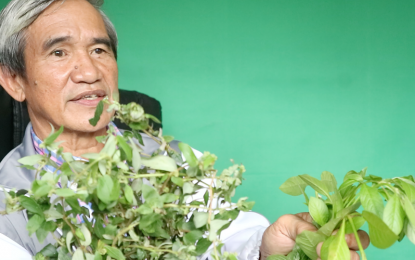
NO LAUGHING MATTER. "Tawa-tawa" plant has been used in the city for dengue patients in the past several years which Dr. John Tinoyan, a former assistant health officer of Baguio, says has been shown to help patients increase their platelet and red blood cells. He said he has been making tawa-tawa capsule by reducing the plant to powder form and gives them for free to dengue patients. (PNA photo Liza T. Agoot)
BAGUIO CITY-- A former official of the city Health Services Office (HSO) here said Thursday he is glad that there are studies to show the use of "tawa-tawa" plant as emergency medicine for dengue patients.
In an interview, Dr. John Tinoyan, former assistant health officer, who handled the emergency medical response team, said his own clinical trial showed that “tawa-tawa” or “gatas-gatasan” which naturally grows on the roads have properties that can increase the platelet and red blood cell of a dengue patient.
Tinoyan said he first did his clinical trial with several patients mostly in Luzon-- his initial trial being his grandchild and the caregiver, who both had dengue.
“I was not afraid because I want my apo to get well. I got the plant, dried it, pounded it and capsulized it and sent it to Manila. They took it while they were hospitalized and three days after, they were out of the hospital,” he said.
His other clinical trials were subjected while the patients were also receiving treatment at a hospital, Tinoyan said.
He noted that none of the patients he gave "tawa-tawa" to was on the brink of death.
Tinoyan said after getting a positive result, he started to place the capsule in the emergency medicine kit of the EMS. For emergency calls from dengue patients, he asked that the tawa-tawa capsule be given for free.
The plant can either be made as powder and capsulized or as simply dried, pounded and added with water and drink it like a tea, he said.
Tinoyan said his inspiration is from the alternative medicine bill of the late Senator Juan Flavier, which aims to give free alternative medicine to indigent patients.
“On my interest as chief of EMS, I thought of using this as an emergency medicine on all emergency case we have to respond to,” he said.
He said Flavier's alternative medicine law names 10 plants, and he looks forward to the inclusion of the tawa-tawa in the list, especially with the DOST’s research findings.
Tinoyan also said that while he wanted to do more research and find out what the plant component, it is just impossible considering that a bioassay- a procedure to identify the component of a plant costs PHP20 million.
He said that it is about time that the Department of Health (DOH) support the extensive research on the plant.
“Everybody could afford [to get it] as long as the plant is available. That's why this is the spirit of the law of alternative medicine to provide free medicines to the indigent, to those who cannot afford expensive medicines,” he said.
The tawa-tawa, he said, naturally grows in temperate areas, but none in Baguio considering the temperature.
Earlier, DOST Secretary Fortunato dela Peña said a herbal supplement developed from “tawa-tawa” using a loan from the DOST will be available by mid-August.
He said the food supplement from "tawa-tawa" that helps fight the dengue virus and increases the platelet count was developed by a company that prioritizes plants or fruits that are known to be associated with illnesses based on folkloric literature.
Dela Peña, however, pointed out that it is a supplement, not a medicine until after a clinical trial or human testing.
Just the prominent food supplement that comes from colored fruits, Tinoyan said he knows that plants or fruits and vegetables with color like violet and brown are high with an antioxidant component which helps in the production of red blood cells.
"I hope there will be more clinical trials,” he said.
“I have a feeling that with the use of tawa-tawa coupled with the usual hospital or doctor management, we would be able to stop deaths due to dengue,” he added.
The DOH in the region recorded that from January 1 to August 10, the Cordillera Administrative Region has recorded 4,704 dengue cases with nine deaths.
Baguio City recorded 135 cases in July and 64 cases for the first half of August. Three cases were recorded in the city for the past four weeks. (PNA)
